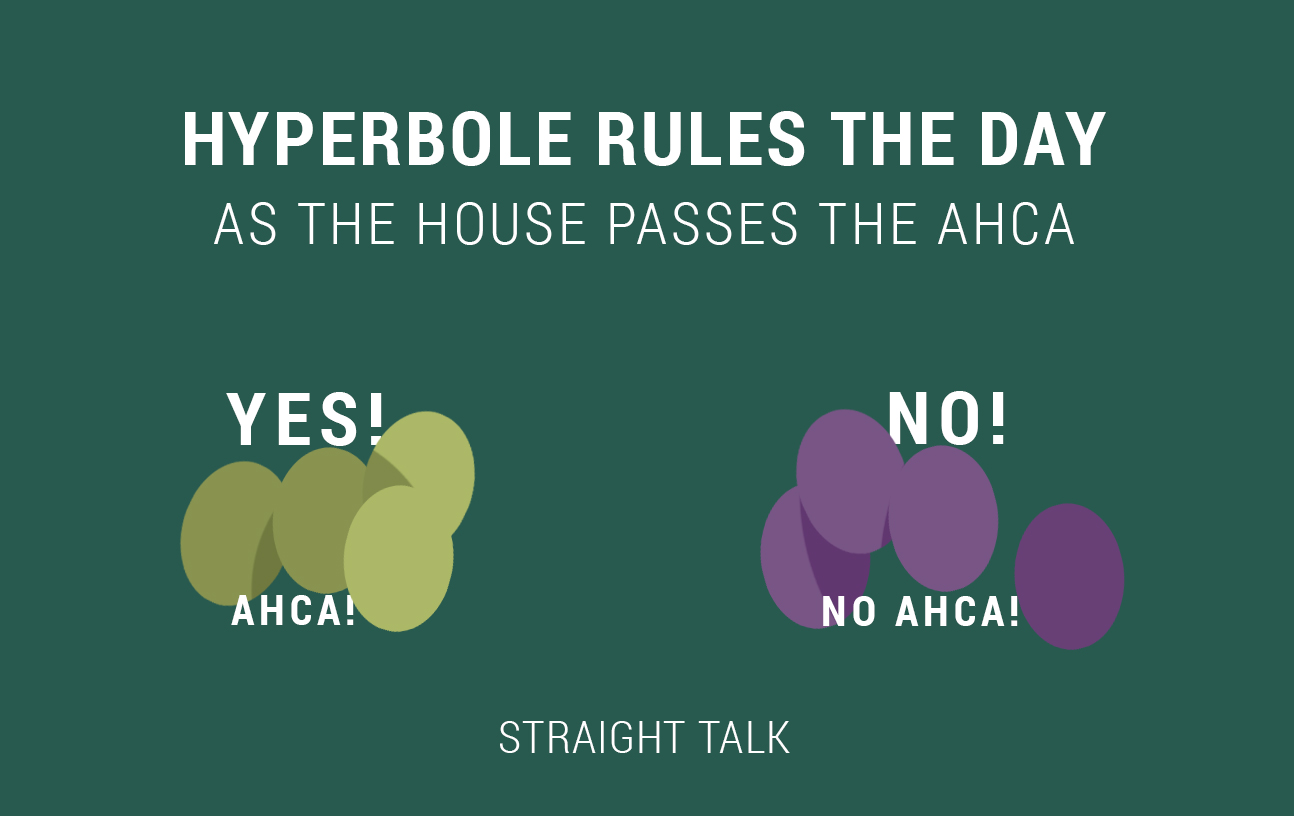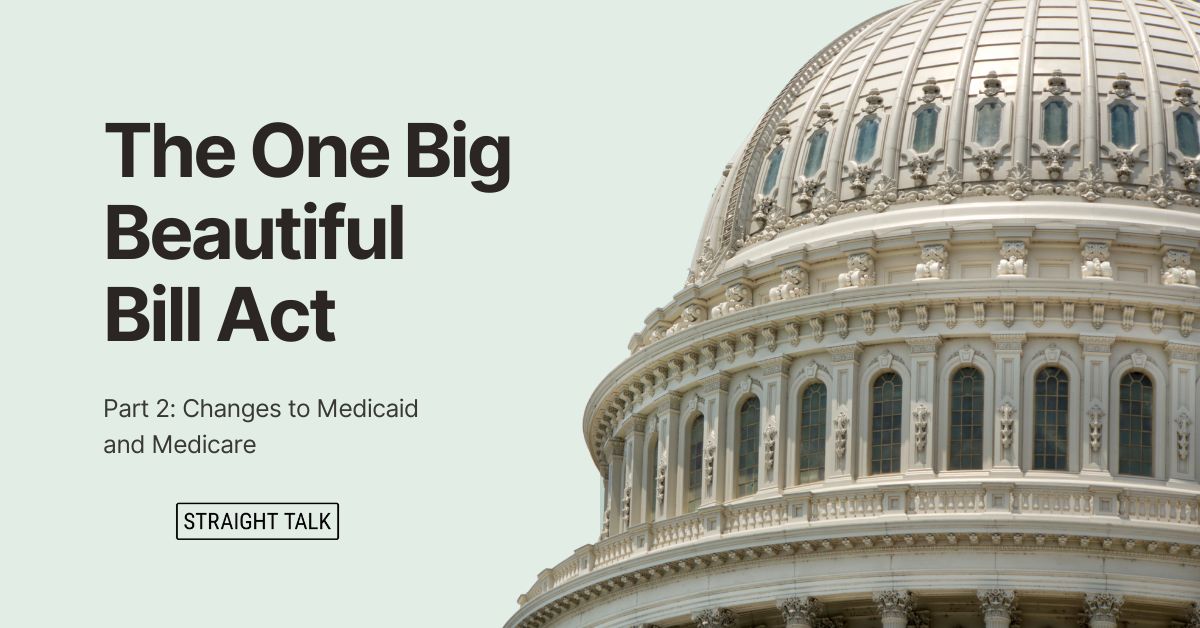The Olives: “The Grapes are Gutting Obamacare!! People will die!”
The Grapes: “Obamacare is FAILING! We need to repeal/replace it!”
On Thursday afternoon, May 4, 2017, the United States House of Representatives, by a vote of 217-213, passed the American Healthcare Act (AHCA). You may recall I talked at length about the proposed act. So now that the House has passed the thing, are we all doomed? Or are your rates already coming down?
Eh, no. Hyperbole aside (Hyperbole = “jumping to conclusions in the loudest voice possible!” – Mike Bertaut), nothing has really happened yet either way.
If I could sum up where we are, I’d say this:
An act has passed the House, where the Republicans had a pretty clear majority, and they still struggled to get it through. Before this act changes anything about your healthcare coverage, a couple of things have to happen:
Roadblock In the Senate?
First, it has to be taken up and passed by the United States Senate. And just because the House passed it does not make Senate passage a foregone conclusion by any means. Several Republican senators have expressed a less-than-enthusiastic response to the AHCA.
Second, there are serious questions about whether or not this act can be approved in its current form by the Senate with only 51 votes (instead of the more typical 60-vote requirement). I think we can expect lots of changes to the AHCA before it could ever get through the Senate.
And even if/when a passed act emerges from the Senate, they have to reconcile it with the House and then get President Trump to sign the final form of the bill to make it a law
Political Theater, In Stereo
I was driving to lunch on Thursday, May 4, while the debate over the AHCA was going on in Congress. I used the C-Span app on my phone with a Bluetooth link so I could listen to the Congressmen scream at each other live over my car’s stereo. I know this sounds bizarre, but I’ve actually done it before. Just the right amount of entertainment for me while I’m munching on my box combo (extra sauce, no coleslaw) and drink!
So, what did I hear?
LOTS of hyperbole. I heard people were going to die if the bill passed, and people were going to die if it didn’t. I heard sick people won’t get coverage, will get coverage, will get charged more, or will get charged less for their health insurance. I heard a long list of organizations that opposed the AHCA, and another list of people who supported it.
I heard that Congress-persons who voted for the act would be “tattooed with failure on their foreheads until they glowed in the dark!” (I kid you not — I almost drove off the road!) And I heard, “People can’t buy coverage unless there is an insurance company there to sell it, and we can be heroes today by making sure there is insurance to buy!” It was funny, and sad, and strangely entertaining all at the same time.
The reality is, this is how we as Americans express our democracy. We should all hear someone say something on a very important topic like this that we can agree with. that means somebody is in D.C. protecting our interests, governing, trying to make life better for folks.
As I was listening to the different debates and points of view on the act, I realized that, once you filtered out the noise, these 435 Congress-persons were speaking for all of us; they were covering every position imaginable. And I found it strangely comforting.
What Are the Sticking Points?
Anyway, it seems to me that the main thing the Republicans are angry about, especially the Freedom Caucus folks, is the amount of regulatory power that the Democrats pulled back from the states to Washington in the healthcare reform law.
You’ve heard me say before that the small group and individual markets are essentially federal fiefdoms since 2010’s passage of the Affordable Care Act. That seems to be the thing that was rubbing the AHCA sponsors the wrong way the most. They specifically created waivers and amendments that give the states the option to take that authority back home if they choose to do so.
In the AHCA, there is a pathway for states to do things like create new definitions of Essential Health Benefits, age rating ratios, community rating and underwriting, and penalties for failing to keep continuous health insurance coverage. States could also draw down federal funding to help pay for the sickest among us, an effort to slow down the rise in premiums we’ve all been experiencing the past few years. (The draw-downs, though, often require a state-matching payment!)
They also seemed upset by all the new taxes and fees that the healthcare reform law put in place, because the AHCA turns almost all of them off. No federal fines for individuals or companies who don’t get or offer coverage. No taxes on medical devices. Turning off the new taxes on insurance companies and pharma the healthcare reform law put in place. Take off extra Medicare payments required of higher-income individuals.
The Democrats did a steadfast job of taking Congressional Budget Office (CBO) estimates and trumpeting them from the highest mountain in opposition. They were very organized. Every time a Republican would speak in favor of the AHCA, the Democratic leader would follow with, “And I’d like to point out that in Representative X’s District, 456,000 people will lose access to care without pre-existing conditions if he votes for the AHCA!” Ultimately, they were all about defending the healthcare reform law and reminding everybody that CBO says 24 million fewer people will have coverage under the AHCA by 2026.
As with most things in D.C., there were (at least) two sides to the story.
Why Do We Care Here in Louisiana?
So that brings me to you and me here at Blue Cross. What do we care about?
Ultimately, I’m pleased that the president and Congress have started to hear the things we’ve been saying since 2014: The individual market is unstable and needed repairs. I can’t be happy on my members’ behalf until some clear path to funding Cost Sharing Reductions has emerged because we have to decide what plans we will sell for 2018 very soon, and what the premium prices for those plans need to be.
More than 50,000 of our friends and neighbors in Louisiana are counting on that financial help, and if the president or Congress can’t commit to helping them, they won’t be able to afford their insurance in 2018. That is a very big deal, and needs to be addressed now.
We also need the Olives and the Grapes in Congress to consider that neither the current tax credit structure nor the one proposed in the AHCA works properly because neither of them considers a person’s age, incomeand geographic location when determining how much help they get. If any replacement healthcare law doesn’t address all three of these factors, many people won’t be able to afford their coverage in 2018. And the market can’t stabilize, and the runaway train of rate increases will just continue. I don’t want that, and neither do you.
So ultimately, even though the AHCA passed the House, it’s still very early in the process. A lot of stuff has to happen before any laws go into effect or actual rules change, and you can bet Blue Cross will be in open dialogue with your Congressional delegation, letting them know in no uncertain terms what you need to afford your health insurance and maintain its quality. It’s the least we can do, and it’s needed to stabilize the market.
We’ll tell it to them Straight. No hyperbole! Just like I do with all of you.





Leave a Reply